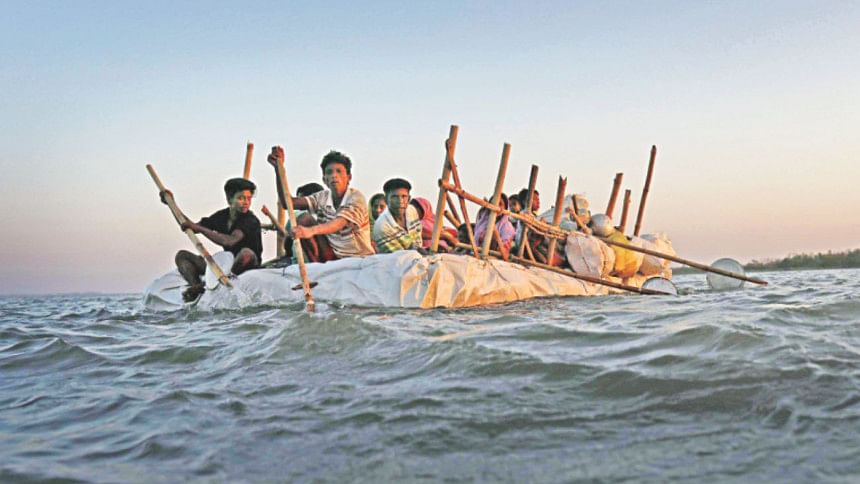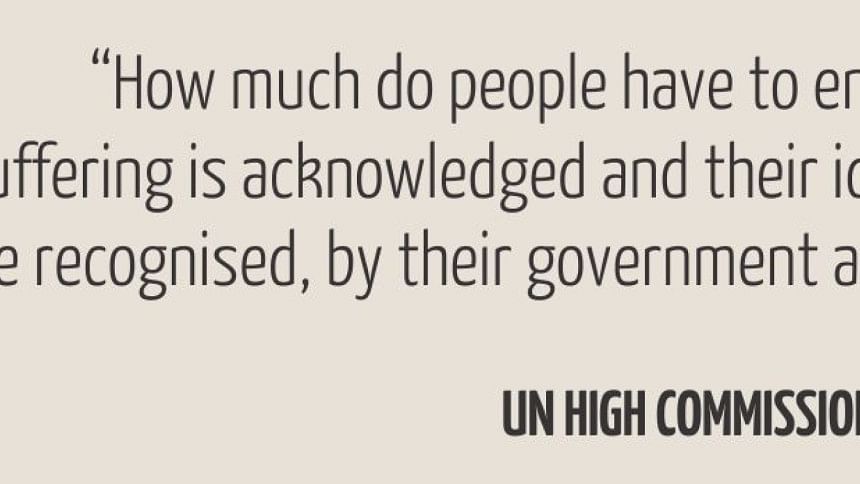UN cannot rule out genocide

UN member states said yesterday that Myanmar was likely committing "crimes against humanity" against its Rohingya minority, while the UN rights chief voiced alarm over possible "elements of genocide".
Following a special session of the UN Human Rights Council, the nations overwhelmingly voted in favour of a resolution expressing grave concern over widespread abuses committed against the largely Muslim minority.
Thirty-three of the council's 47 members backed the text listing a long line of horrific abuses, including summary killings of children, rape, torture and large-scale forced displacement, which it said indicated "the very likely commission of crimes against humanity."
The resolution also called on the government to ensure justice for victims and access for UN investigators and aid workers.
Brought by Bangladesh, it was passed by 33 votes. Nine countries, including India, refrained from voting while three others -- China, Burundi and the Philippines -- voted against it.
Addressing the special session, UN High Commissioner for Human Rights Zeid Ra'ad al-Hussein said Myanmar's security forces may be guilty of genocide against the Rohingyas.
And more of the persecuted group are fleeing despite a deal between Myanmar and Bangladesh to send them home, he added.
The UN defines genocide as acts meant to destroy a national, ethnic, racial or religious group in whole or in part. Such a designation is rare under international law, but has been used in contexts including Bosnia, Sudan and an Islamic State campaign against the Yazidi communities in Iraq and Syria.
Zeid, who earlier had described the military campaign against Rohingyas as a "textbook case of ethnic cleansing", said none of the 626,000 Rohingya who have fled violence to Bangladesh since August should be repatriated to Myanmar unless there was robust monitoring on the ground.

He described reports of "acts of appalling barbarity committed against the Rohingya, including deliberately burning people to death inside their homes, murders of children and adults; indiscriminate shooting of fleeing civilians; widespread rapes of women and girls, and the burning and destruction of houses, schools, markets and mosques".
"Can anyone rule out that elements of genocide may be present?" he told the 47-member state forum.
Zeid urged the rights council to ask the UN General Assembly to launch a new "impartial and independent mechanism", complementary to the work of a fact-finding mission already dispatched by his office, to "assist individual criminal investigations of those responsible".
His office had sent three teams to Bangladesh this year to monitor the situation and interview refugees. Witnesses reported acts of appalling barbarity committed against the Rohingyas, including deliberately burning people to death inside their homes; murders of children and adults; indiscriminate shooting of fleeing civilians; widespread rapes of women and girls; and the burning and destruction of houses, schools, markets and mosques.
The UN rights chief called upon the special session “to take the appropriate action to stop this madness now” and asked: “How much do people have to endure before their suffering is acknowledged and their identity and rights are recognised, by their government and by the world?”
An army-led crackdown has forced some 626,000 people to flee from northern Rakhine State and across the border into squalid camps in Bangladesh in recent months, leaving hundreds of villages burned to the ground.
'COMPARABLE TO RWANDA'
The council rarely holds special sessions, which can only be convened at the request of at least a third of its 47 member states, or 16 countries.
Yesterday's session was held at the request of Bangladesh and Saudi Arabia, with the support of 33 council members and more than 40 observer states.
Shahriar Alam, Bangladesh's state minister for foreign affairs, warned that the massive exodus over such a short period was "comparable only with the exodus following the 1994 Rwanda genocide".
He told the session that his country was hosting nearly one million "Myanmar nationals" following summary executions and rapes "as a weapon of persecution".
These crimes had been "perpetrated by Myanmar security forces and extremist Buddhist vigilantes", he said, calling for an end to what he called "xenophobic rhetoric including from higher echelons of the government and the military".
On the sidelines of the UN rights body's meeting, Shahriar met Lord Ahmad, British prime minister's special representative on preventing sexual violence in conflict.
"The UK reiterated its support to Bangladesh over Rohingya issue," he said after the meeting.
They discussed the implementation of recently signed document between Bangladesh and Myanmar on return of Rohingyas to their homeland.
The state minister also met Zeid and appreciated the latter's speech saying the UN rights chief lauded efforts taken by the Hasina government.
CRIMINAL INVESTIGATIONS
Prosecutions for the violence and rapes against Rohingya by security forces and civilians "appear extremely rare", Zeid said.
Marzuki Darusman, head of an independent international fact-finding mission on Myanmar, said by video from Malaysia: "We will go where the evidence leads us."
His team has interviewed Rohingya refugees, including children in the Bangladeshi port city of Cox's Bazar, who recounted "acts of extreme brutality" and "displayed signs of severe trauma".
Myanmar has not granted the investigators access to Rakhine, the northern state from which the Rohingya have fled, Darusman said. "We maintain hope that it will be granted early in 2018."
Pramila Patten, special envoy of the UN Secretary-General on sexual violence in conflict, who interviewed survivors in Bangladesh in November, said: "I heard the most heart-breaking and horrific accounts of sexual atrocities reportedly committed in cold blood out of a lethal hatred of these people solely on the basis of their ethnicity and religion".
Crimes included "rape, gang rape by multiple soldiers, forced public nudity and humiliation, and sexual slavery in military captivity", Patten said.
Myanmar's ambassador to the UN in Geneva, Htin Lynn, did not address those accusations, but insisted to the council that the humanitarian situation at its border with Bangladesh was of "paramount concern", and that Yangon was "making every effort to resolve the issue."
He also denied Zeid's claim that Yangon was doing little to rein in hate speech and incitement to violence against the minority, insisting "my government is doing everything possible to deter these individual acts."
The envoy said that his government was working with Bangladesh to ensure returns of the displaced in about two months and "there will be no camps".
On the resolution, he said his government "disassociated" itself from the text and denounced what he called "politicisation and partiality".
[Reuters, AFP, Ohchr.org and UNB]

 For all latest news, follow The Daily Star's Google News channel.
For all latest news, follow The Daily Star's Google News channel. 



Comments